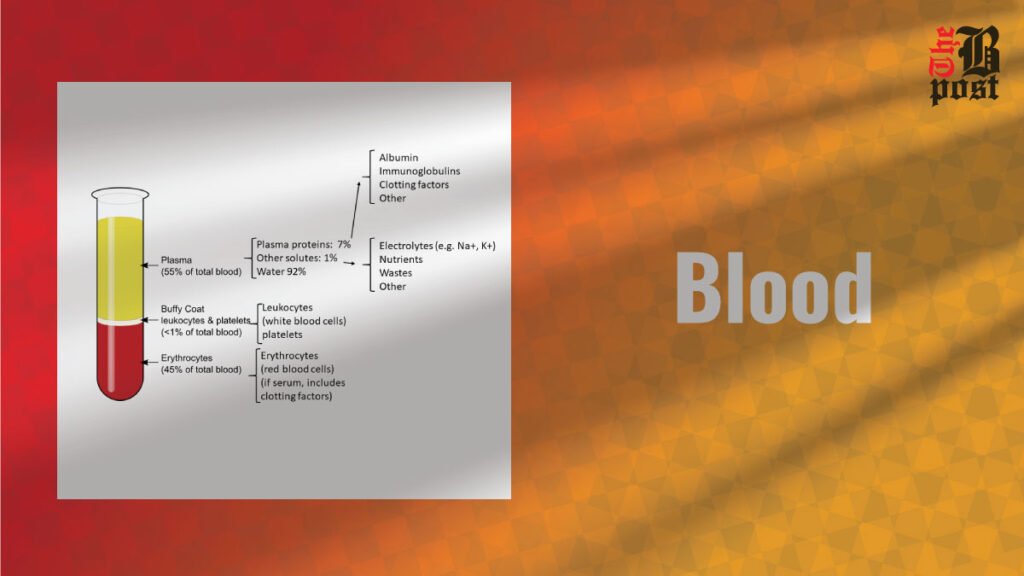Blood is an important fluid that sustains life. It is responsible for transporting oxygen, nutrients and waste products throughout the body, maintaining homeostasis and protecting against infection. In this article we will explore the functions, components and importance.
Functions
Blood performs many vital functions that are essential for survival:
- Transport: Blood carries oxygen from the lungs to the tissues of the body and returns carbon dioxide to the lungs for exhalation. It also transports nutrients from the digestive tract to cells and removes metabolic waste.
- Regulation: They helps regulate body temperature, pH balance and fluid volume. These regulatory functions ensure that the body’s internal environment remains stable.
- Defense: It contains WBC’s and antibodies that protect against pathogens. Platelets help to clot and prevent excessive bleeding from wounds.
Components of Blood
Blood consists of several key components, each with its own function:
- Plasma: Plasma is the liquid part, which makes up about 55% of its volume. It is mainly water, but also contains proteins, electrolytes, nutrients, hormones and waste products. Plasma acts as a medium to transport these substances throughout the body.
- Red blood cells (RBC): RBC’s, or erythrocytes, are the most abundant cells in the blood. They contain hemoglobin, a protein that binds oxygen, allowing erythrocytes to transport oxygen from the lungs to the tissues and carbon dioxide from the tissues to the lungs.
- White blood cells (WBC): WBC’s, or leukocytes, are essential for the immune system. They protect the body from infection by attacking bacteria, viruses and other foreign invaders.
- Platelets: Thrombocytes, are small cell fragments involved in clotting. They accumulate at the site of injury, forming a temporary plug to prevent blood loss.
Importance of Blood
- Oxygen Delivery: It provides oxygen access to every cell, which supports cellular respiration and energy production.
- Nutrient supply: They supply cells with essential nutrients such as glucose, amino acids and vitamins to facilitate growth and repair.
- Waste disposal: It carries waste products such as urea and carbon dioxide to the excretory organs for disposal and maintenance of metabolic balance.
- Immune protection: WBC’s and antibodies protect against infection, while platelets and clotting factors prevent excessive bleeding.
- Distribution of hormones: It carries hormones from endocrine glands to target organs, regulating various physiological processes.
Blood Disorders
Blood can be affected by various disorders that affect its ability to perform these important functions. For example, anemia is caused by a lack of RBC’s or hemoglobin, which causes fatigue and weakness. Leukemia is a cancer of WBC’s that weakens the immune system. Hemophilia is a genetic disease that affects clotting and causes excessive bleeding. Understanding these disorders underscores the importance of maintaining healthy blood.
Maintaining Healthy Blood
Healthy blood is essential for overall well-being. A balanced diet rich in iron, vitamins and minerals supports the production of RBC’s. Regular exercise improves circulation and heart health. Hydration ensures adequate plasma. Avoiding smoking and limiting alcohol consumption can also improve overall health.
Conclusion:
In short, blood is a life-giving fluid that performs important functions such as transportation, regulation and protection. Its components, including plasma, RBC’s, WBC’s and platelets, work together to maintain the health and stability of the body. Understanding the importance and maintaining its health through proper diet, exercise and lifestyle choices is essential to overall well-being. When we understand the complexity and importance, we can better appreciate the remarkable ways our bodies sustain themselves.
